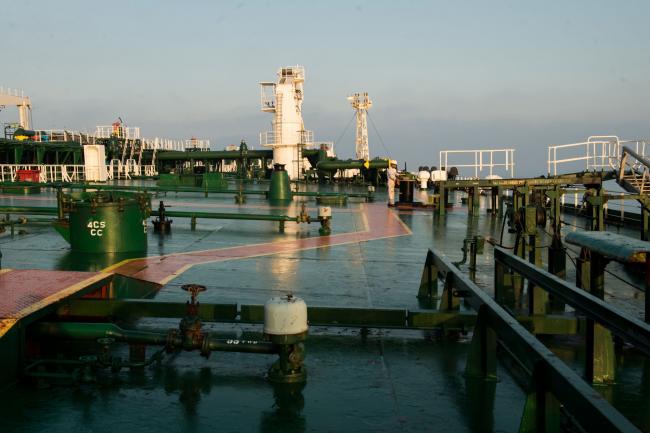(Bloomberg) -- Tankers are offloading millions of barrels of Iranian oil into storage tanks at Chinese ports, creating a hoard of crude sitting on the doorstep of the world’s biggest buyer.
Two and a half months after the White House banned the purchase of Iran’s oil, the nation’s crude is continuing to be sent to China where it’s being put into what’s known as “bonded storage,” say people familiar with operations at several Chinese ports. This oil doesn’t cross local customs or show up in the nation’s import data and is not necessarily in breach of sanctions. And while it remains out of circulation for now, its presence is looming over the market.
The store of oil has the potential to push down global prices if Chinese refiners decide to draw on it, even as Organization of Petroleum Exporting Countries and allies curb production amid slowing growth in major economies. It also allows Iran to keep pumping and move its oil nearer to potential buyers.
“Iranian oil shipments have been flowing into Chinese bonded storage for some months now, and continue to do so despite increased scrutiny,” said Rachel Yew, an analyst at industry consultant FGE in Singapore. “We can see why the producer would want to do so, as a build-up of supplies near key buyers is clearly beneficial for a seller, especially if sanctions are eased at some point.”
There could be more Iranian oil headed for China’s bonded storage tanks, Bloomberg ship-tracking data show. At least ten very-large crude carriers and two smaller tankers owned by the state-run National Iranian Oil Company and its shipping arm are currently sailing toward China or idling off its coast. The vessels have a combined carrying capacity of over 20 million barrels.
The bulk of Iranian oil in China’s bonded tanks is still owned by Tehran and therefore not in breach of sanctions, according to the people. The oil hasn’t crossed Chinese customs so it is theoretically in transit.
Some of the crude, though, is owned by Chinese entities that may have received it as part of oil-for-investment schemes. For example, a Chinese oil company could have helped fund a production project in Iran under an agreement to be repaid in kind. Whether this sort of transaction is in breach of sanctions isn’t clear, and so the Chinese companies are keeping it in bonded storage to avoid the official scrutiny it would get once it is registered with customs, according to the people.
Nobody replied to a faxed inquiry to China’s General Administration of Customs.
Lack of Clarity
The build-up of Iranian oil in Chinese bonded storage has yet to be clearly addressed by Washington. The White House ended waivers allowing some countries to keep importing Iranian oil on May 2.
There are currently no exemptions issued to any country for the import of Iranian oil, and any nation seen importing cargoes from the Persian Gulf producer will be in breach of sanctions, according to a senior Trump administration official, who asked not to be identified because he wasn’t authorized to speak publicly about the matter.
“The U.S. will now need to define how it quantifies the infringement of sanctions,” said Michal Meidan, director of the China Energy Programme at the Oxford Institute for Energy Studies. There’s a lack of clarity on whether it would look at “financial transactions or the loading and discharge of cargoes by company or entity,” she said.
China received about 12 million tons of Iranian crude from January through May, according to ship-tracking data, versus about 10 million that cleared customs over the period. The discrepancy could be due to the flow of oil into bonded storage.
One of the Iranian tankers that appears to have loaded oil after the U.S. waivers ended is very-large crude carrier Horse. It discharged at Tianjin in early-July after sailing from the Middle East where shipping data showed it signaling its destination as Iran’s Kharg Island on May 4.
Several other Iranian-owned tankers offloaded in China or were heading there, according to ship tracking data. VLCC Stream discharged at Tianjin on June 19, while Amber, Salina and C. Infinity offloaded crude at the ports of Huangdao, Jinzhou and Ningbo. Tankers Snow, Sevin and Maria III were last seen sailing in the direction of China.
Putting crude into bonded tanks in China also means Iran can avoid having to tie up part of its tanker fleet by storing the oil at sea for months at a time. The Islamic Republic used floating storage in 2012 to 2016 and again in 2018 as buyers shunned its crude due to U.S.-imposed trade restrictions.
Should the Iranian crude leave bonded storage and end up in the market it could pressure oil prices, according to Bank of America Merrill Lynch (NYSE:BAC). West Texas Intermediate plunged more than 20% from late April to mid-June as the U.S.-China trade war intensified. It’s since recovered some of those losses, partly as a result of the rising tension between Washington and Tehran, and is trading near $56 a barrel.
“A further escalation in U.S. tariffs on Chinese goods could jointly drive global economic growth a lot lower and encourage Iran-China cooperation,” Bank of America Merrill Lynch said in a June note. “If Chinese refiners start to purchase Iran oil in large volumes on a sustained basis as U.S. tariffs rise again, WTI could drop to $40 a barrel.”
